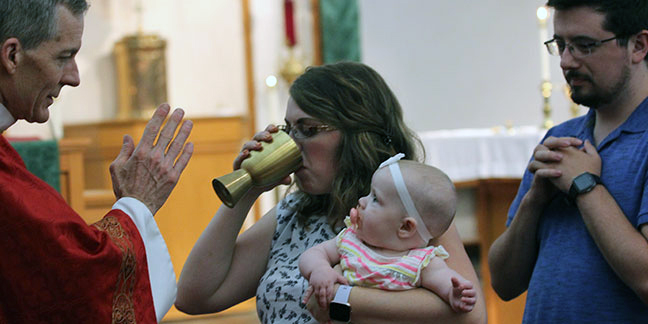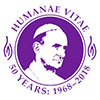 CHARLOTTE — “We celebrate ‘Humanae Vitae’ because it is a great document giving insight and depth to human sexuality and to human nature itself,” Father Joshua Voitus said in the opening words of his homily at the 50th anniversary Mass celebrated July 25 at St. Vincent de Paul Church.
CHARLOTTE — “We celebrate ‘Humanae Vitae’ because it is a great document giving insight and depth to human sexuality and to human nature itself,” Father Joshua Voitus said in the opening words of his homily at the 50th anniversary Mass celebrated July 25 at St. Vincent de Paul Church.
The encyclical written by Blessed Paul VI was met with cheers and also jeers when it was published July 25, 1968.
In the encyclical, Blessed Paul said that the only licit means of regulating birth is natural family planning. In the document, he asked scientists to improve natural family planning methods “providing a sufficiently secure basis for a regulation of birth founded on the observance of natural rhythms.”
Blessed Paul issued “Humanae Vitae” as artificial contraception, particularly the birth control pill, began to become commonplace.
Read our complete 50th anniversary package: 'Humanae Vitae' said rooted in respect church has for human dignity.
He also predicted that if its message was not heeded there would be dire consequences: the devaluing of human love, the devaluing of human sexuality, and strained, broken relationships.
“We celebrate tonight because in the world at large, the message has not been heeded,” Father Voitus said. “In the world at large it has been largely ignored, spurned and ridiculed. Those dire consequences have indeed come to pass in our own day.
“So our celebration is somewhat bittersweet.”
The document’s controversial reception is a great shame and a tragedy, he continued.
“The fact that the document became a source of fighting and conflict – a source of great bitterness throughout the world – it prevented it for being seen for what it truly was,” a beautiful document that teaches people about the beauty and depth of human nature and the beauty and depth of human love, he said.
Human love is meant to be about the love between a man and a woman, reflecting the self-giving love between God and His Church.
This teaching should have filled the whole world with light, joy and happiness, Father Voitus said. Instead, the document became a source of conflict, tension, bitterness and fighting over the past five decades.
“We’re here tonight to recommit ourselves to love, to recommit ourselves to this idea of human love mirroring divine love, a love that is self-giving, withholding nothing. A love that is sacrificial, willing to suffer, willing to die for the other, willing to give the whole self for the other."
A couple striving to live the spirit of “Humanae Vitae” are Shawn and Riley Provost.
Riley was recently hired as the new faith formation director at St. Vincent de Paul Parish. They were at Mass with their 6-month-old daughter Bentley.
The couple, married for almost two years, studied “Humanae Vitae” at Franciscan University in Steubenville, Ohio. They said it has played a huge role in their marriage.
“We have definitely been able to implement it in our marriage,” Riley Provost said.
Shawn Provost said Father Voitus’ homily was a great reminder to “make sure that our love spreads from our family out into the community.”
When asked about how large of a family they are considering, Riley Provost replied, “As big as God wants it.”
Susan Brock, wife and mother of eight children, brought her family to Mass to mark the 50th anniversary of “Humanae Vitae.”
“I think being open to God and knowing the truth has made our marriage what God intended it to be,” Brock said. “Anything that comes from God is good and fruitful. Our marriage has obviously been fruitful. I can say it has been good.”
In the closing remarks of his homily, Father Voitus encouraged those gathered to recommit to this idea of human love mirroring divine love.
“We should allow ourselves to bask in this love of God. We should allow ourselves to be reminded that although 'Humanae Vitae' has great value, and although it is this great mirror of God and tells us of the love of God, it is no surprise it creates conflict – for so does Christ, so does the preaching of the Gospel wherever it goes,” he noted.
“Tonight in this temple of God we should take this opportunity not to fight, but to bask in the love of God, bask in the self-sacrificial love of God and recommit ourselves not just to the fight but to love. To love one another with that divine love of God. To love God with all our heart, mind and strength. To remind ourselves that is why we are in it.
“We are here because we are fighting for love,” he said.
— SueAnn Howell, senior reporter


















